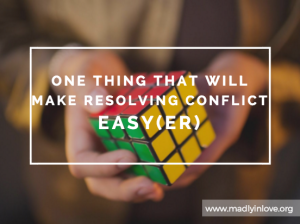I can think of a number of occasions when I was in a disagreement with my wife, my kids, or a friend. No doubt you can too. Recall the discomfort you felt, the tension in your body, the lack of certainty of what to do next.

It is very difficult to feel any differently when conflict happens because of the fight, flight, or freeze button activated in our brains. There is however, one thing we can do to lessen those reactions and make resolving conflict easy(er).
Practice mutual regard.
What it means:
Depending upon your dictionary, here is what it means:
REGARD: “Consider or think of in a specified way.” (Oxford)
Is the person in front of you a friend or foe? What you decide will shape the outcome of the conversation.
REGARD: “To recognize the worth of a person or thing” (Webster)
Do you view each other as valuable? When doing so, it shapes the way in which you communicate to each other.
Consider the history of the word regard: “Middle English, from Anglo-French regarder to look back at, regard, from re- + garder to guard, look at.”
How to do it:
To regard your spouse, your child, or friend means “to look back at and guard.” Look back at the person you are talking to. Remind yourself of their intrinsic value. Look back to appreciate who they are and the relationship you have had with them.
Then consider this: guard your reactions. Guard the person you are talking to from your hurt and anger. Guard their value. And guard that relationship. When doing so, it all but guarantees the best possible outcome.
When in conflict, practice mutual regard – remember each person has value! (Tweet this)
Practical tips:
That person you disagree with matters. You may not agree with what they are saying or doing, but they have value as a person, a friend, a father, a mother, a husband, a wife, or a child. Regard them as such!
Some practical ideas of what this means:
- Be careful, meaning “be full of care,” in how you speak to each other. Just because you are mad or hurt, doesn’t mean you have a right to respond in like manner.
- Don’t let your emotions control you. I am not saying to ignore them. I am saying control them – so you can communicate in a way that regards the other.
- Be sensitive to timing. Most couples fight when it is time to go to bed. Bad idea.
- Remind yourself of what you appreciate about the person you are in conflict with.
- Have love as your goal, rather than winning or losing. Most people argue as if it were a do or die situation. Rarely does this lead to anything but both losing and the relationship dying. (Tweet this)
- Remember the golden rule: “do unto others as you would like them to do unto you.” If you don’t like being interrupted when talking, don’t interrupt them. If you want them to listen well to you, then listen well to them.
My son recently gave me some criticism over a blog I wrote. He did so with regard to who I am. I was thankful he did. I felt respected by him rather than disdained. What’s more is I was able to consider and receive the criticism as a means to help me become a better writer.
Having regard for one another doesn’t guarantee your conflict will get resolved well, but it sure ups the chances.
Practice mutual regard today!




Leave a Reply